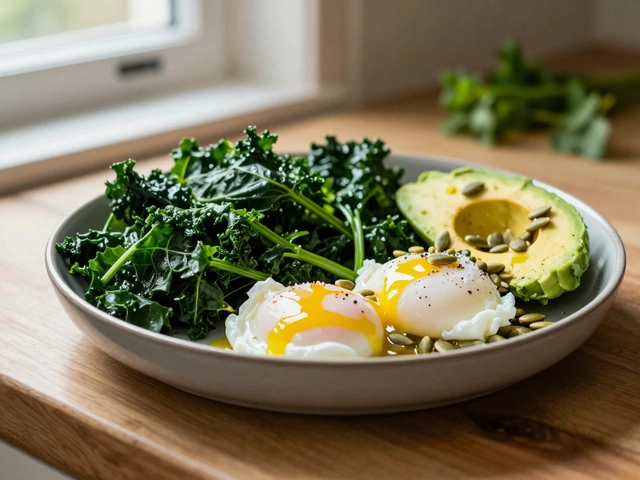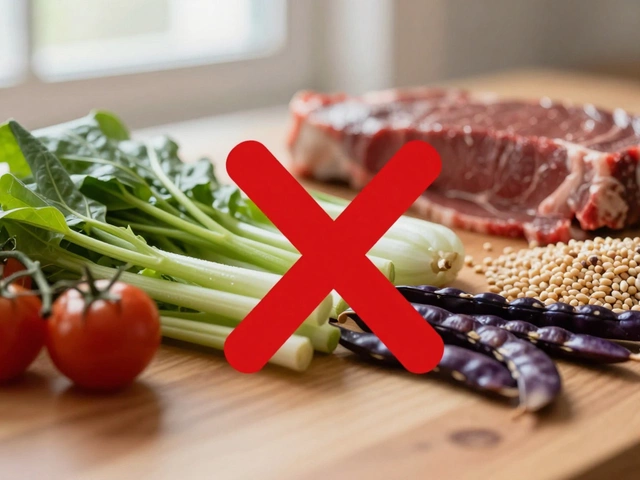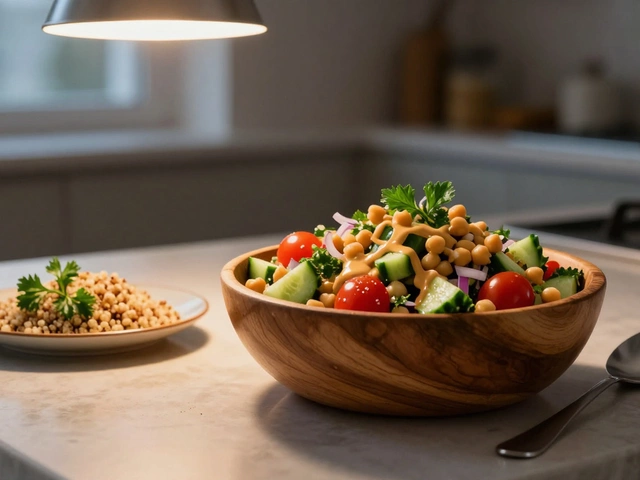If you've ever tried making a new friend a breakfast omelet and got a weird look, you know how blurry the vegetarian line can be. Eggs seem simple, but they're right at the heart of the vegetarian debate. Some people who call themselves vegetarian eat them daily, others avoid them at all costs. What gives?
Here's the scoop: Whether eggs count as vegetarian food isn't a black-and-white thing—no pun intended. It depends on the exact kind of vegetarian and how they define their diet. Knowing this can save you from kitchen surprises and awkward dinner invites. In the world of vegetarianism, food choices aren’t built on strict rules but on personal values and background.
Understanding the different takes on eggs isn't just about labels. It actually makes meal planning easier, especially if you're cooking for someone else or thinking of switching things up yourself. So, if you’re stuck wondering if you need to ditch eggs to be considered vegetarian—or you're just searching for everyday hacks on how to cook with (or without) eggs—you’re definitely not alone.
- Types of Vegetarians
- The Egg Debate: Where Eggs Fit In
- Why Some Vegetarians Choose Eggs
- Egg-Free Cooking Swaps
- Reading Food Labels
- Top Vegetarian Recipes With and Without Eggs
Types of Vegetarians
Not every vegetarian follows the same rules, which causes lots of confusion when you're trying to figure out who eats what. Here’s a breakdown of the main groups—and where eggs land with each.
- Ovo-vegetarians: These folks skip meat, poultry, and fish but do eat eggs. This is where the "ovo" comes in—it’s Latin for egg. So, for them, making scrambled eggs or a veggie omelet is totally fine.
- Lacto-vegetarians: This group avoids all meat, poultry, fish, and eggs but eats dairy like milk, cheese, and yogurt.
- Lacto-ovo vegetarians: They avoid animal flesh and fish but are cool with both eggs and dairy. This is the most common type in the U.S.
- Vegans: They steer clear of anything from animals. That means no eggs, milk, cheese, or honey—nothing that comes from an animal at all.
- Flexitarians: They mainly eat plant-based but will sometimes eat meat or animal products, including eggs, usually in social situations or when it's simple and convenient.
Take a look at how these choices stack up:
| Type | Eats Eggs? | Eats Dairy? | Eats Meat/Fish? |
|---|---|---|---|
| Ovo-vegetarian | Yes | No | No |
| Lacto-vegetarian | No | Yes | No |
| Lacto-ovo vegetarian | Yes | Yes | No |
| Vegan | No | No | No |
| Flexitarian | Sometimes | Sometimes | Sometimes |
So if you’re ever shopping for a potluck, check which kind your guests are. That one question saves lots of headaches when you’re picking out recipes to try.
By the way, the keyword here is vegetarian—but as you can see, even that’s got layers.
The Egg Debate: Where Eggs Fit In
The question pops up a lot: do vegetarians actually eat eggs? The short answer is—it depends. Some vegetarians are cool with eggs, and some want nothing to do with them. There's even a specific term for vegetarians who eat eggs: ovo-vegetarian. These folks skip meat, poultry, and fish but still enjoy scrambled eggs or a veggie frittata now and then.
Why all the back-and-forth? Well, it comes down to whether someone counts unfertilized eggs as "animal flesh" or not. For most vegetarians in the U.S. and Europe, eggs are seen as fine, since no animal is actually killed to get an egg. But some people, especially those following diets inspired by religions like Jainism or certain Hindu practices, cut out eggs completely because they consider any animal-sourced food off-limits.
Here’s a quick breakdown of who eats eggs and who doesn’t:
- Lacto-vegetarians: Say yes to dairy but no to eggs.
- Ovo-vegetarians: Eggs are good. Dairy might not be.
- Lacto-ovo vegetarians: Eggs and dairy are both fair game, while meat and fish are out.
- Vegans: No animal products at all – that’s a hard no to eggs.
Wondering how common this is? According to a 2023 survey by Statista, about 68% of self-identified vegetarians in the United States say they eat eggs regularly. That’s a lot of omelets and pancakes still on the table.
| Vegetarian Type | Eats Eggs? | Notes |
|---|---|---|
| Lacto-ovo vegetarian | Yes | Eats both eggs and dairy |
| Ovo-vegetarian | Yes | Avoids dairy, eats eggs |
| Lacto-vegetarian | No | Eats dairy, but not eggs |
| Vegan | No | No animal products at all |
The grocery aisle can make it even more confusing. Some products, like baked goods or pasta, have hidden eggs—so vegetarians need to double-check labels if they're avoiding them. Busy? Look for "contains egg" near the allergen info.
Here’s the takeaway: whether eggs count depends on how each vegetarian draws their line. If you’re cooking or buying for someone else, just ask about their egg stance—nobody minds a quick check-in at breakfast.
Why Some Vegetarians Choose Eggs
Eggs pop up on a lot of vegetarian shopping lists, and there's a practical reason for it: nutrition. People often worry about getting enough protein on a vegetarian diet. Well, eggs pack about 6 grams of high-quality protein in just one large egg. That’s a big help, especially for beginners figuring out how to build meals without meat.
You also get a bunch of vitamins and minerals from eggs. Check this out:
| Nutrient | 1 Large Egg (% Daily Value) |
|---|---|
| Protein | 6g |
| Vitamin B12 | 21% |
| Vitamin D | 6% |
| Choline | 31% |
| Iron | 5% |
These nutrients matter, especially B12 and choline, because you can’t get much of them from plants alone. If you cut out meat and dairy, an egg here and there plugs a lot of gaps. Some vegetarians (specifically ovo-vegetarians) eat eggs for exactly this reason. It’s just practical.
There’s another reason that has nothing to do with nutrition: convenience. Eggs are cheap, last weeks in the fridge, and show up in a ton of recipes—both sweet and savory. They make breakfast way easier, throw together a quick dinner, or add richness to baked treats. No complicated prep, just crack and cook.
Of course, for some people, eggs fit into their values too. If the eggs come from local or ethical farms where chickens aren’t kept in lousy conditions, it feels like a better deal. Supermarkets have cage-free, pasture-raised, or organic labels for a reason.
If you’re vegetarian for health rather than animal rights, eggs can be a guilt-free add-on. And honestly, a lot of people just love the taste—think scrambled eggs, omelets, or a runny yolk on toast. That taste can be hard to give up!
- Eggs support a balanced diet with easy-to-absorb protein.
- They help you get nutrients missing from plants.
- They’re versatile, affordable, and simple to prepare.
- Eggs from ethical farms align better with some vegetarians’ values.

Egg-Free Cooking Swaps
If you’re skipping eggs but still want to make pancakes that actually stick together or bake brownies that don’t end up crumbly, you’ve got options. There’s no shortage of handy substitutes for eggs in all kinds of recipes, whether you’re aiming for the classic texture, flavor, or just need a reliable binder.
For most baking (think cakes, muffins, or cookies), a common trick is to use a "flax egg." All you do is mix 1 tablespoon of ground flaxseed with 2.5 tablespoons of water, stir, then let it sit for a few minutes. The mix gets a gooey texture, kind of like a real egg. Chia seeds work the same way—just swap flax for chia, and you’re set.
If you’re making something where lift matters, like a fluffy cake, try mixing 1 tablespoon of vinegar with 1 teaspoon of baking soda. This mix reacts in the oven, making your baked stuff rise similarly to eggs. Bananas and applesauce are also big in the egg-free world—smash half a banana or scoop in a quarter cup of applesauce, and you’ve got a solid binder with a hint of fruitiness.
- Vegetarian brands offer commercial egg replacers, which are simple powders to mix with water. You’ll find these at grocery stores, and they work in everything from pancakes to veggie burgers.
- Silken tofu is your friend for things like quiches or dense cakes. Blend a quarter cup until smooth and swap it in for each egg.
- If you want a savory swap, like for a breading station or a casserole, try aquafaba—the liquid from a can of chickpeas. Three tablespoons of aquafaba equals one egg, and it even whips up for homemade vegan meringue.
Don’t be afraid to experiment. Keeping these swaps in your kitchen makes baking and cooking egg-free feel pretty normal. People honestly won’t notice unless you tell them.
Reading Food Labels
So you walk into the grocery store trying to keep your diet on track, but the labels are a minefield. Food companies love using words like "vegetarian" or "egg-free," but if you’re not careful, it’s easy to miss hidden eggs in places you’d never expect. Even if you eat eggs as an ovo-vegetarian, knowing what's inside helps you avoid surprises.
Here's the trick: eggs show up under lots of different names and forms. Watch out for these common code words on packaging:
- Albumin
- Ovalbumin
- Globulin
- Livetin
- Egg powder or dried egg
- Lysozyme (sometimes from eggs)
And it’s not just fake burgers or snacks—lots of breads, pastas, salad dressings, and even veggie patties may contain egg as a binder.
Going for packaged foods marked as "suitable for vegetarians"? That doesn't always mean they're egg-free. Some brands include eggs and still slap on a vegetarian label, especially in the U.S. When in doubt, flip over the box and check the ingredients list.
Want to avoid eggs (or make sure they’re there)? Look for these categories or terms:
- "Ovo-vegetarian": contains eggs
- "Lacto-vegetarian": no eggs, dairy is OK
- "Vegan": no animal products, so no eggs at all
- "May contain traces of egg": for people with egg allergies, this matters, but most vegetarians are fine with it if they eat eggs
Check this quick rundown of how often eggs sneak into popular groceries:
| Product | % Containing Eggs (2024 grocery survey) |
|---|---|
| Burger buns | 23% |
| Pasta (boxed) | 36% |
| Salad dressings | 19% |
| Veggie burgers | 44% |
When you’re not sure about something, call the brand or check their website. Most big companies list allergen info online. Apps like "Is It Vegan?" or "Fig" can scan barcodes and tell you if eggs are in there or not. It saves you a headache and keeps your eating choices on your terms.
Top Vegetarian Recipes With and Without Eggs
It doesn’t matter if you’re cool with eating eggs or want to skip them—there are loads of solid vegetarian recipes for every situation. Let’s break it down by both styles, so you can find exactly what works for you (or your guest).
Vegetarian recipes with eggs—called ovo-vegetarian dishes—are classics for a reason. Eggs add protein, help hold foods together, and make meals more filling. Here are some winners:
- Veggie Frittata: Whisk eggs with chopped spinach, tomatoes, onions, and cheese. Pour in a pan and bake for 20 minutes. Great hot or cold, and easy to pack for lunch.
- Shakshuka: This North African favorite simmers eggs in a tomato and pepper sauce. Crack eggs right into the bubbling mixture—perfect for brunch or any time you want something with a kick.
- Egg Salad Sandwich: Mash hard-boiled eggs with Greek yogurt, mustard, and your favorite chopped veggies. Pile it on whole grain bread for protein that actually fills you up.
- Vegetable Quiche: Use a premade crust or go crustless, pour in eggs, milk, and a pile of fresh veggies, then bake. Leftovers taste just as good.
If you’d rather skip eggs (or you’re cooking for someone who does), you still have tons of tasty options. Here’s how to keep it interesting—without eggs:
- Chickpea Omelet: Seriously, you can whip chickpea flour with water and spices into a batter and cook it like an omelet. Add peppers, onions, and a bit of turmeric for color and flavor.
- Tofu Scramble: Crumble firm tofu and sauté with garlic, nutritional yeast, and any veggies you have. It looks like scrambled eggs and soaks up seasonings just as well.
- Vegan Pancakes: Use mashed banana or a "flax egg" (one tablespoon ground flaxseed + three tablespoons water) as a binder. You won’t miss regular eggs at all.
- Lentil Loaf: Want a hearty, main-dish recipe? Mix cooked lentils, oats, sautéed veggies, and tomato paste. Bake in a loaf pan—the texture is great with or without eggs.
Pro tip: If you’re baking egg-free, try swapping eggs for unsweetened applesauce, silken tofu, or the flaxseed trick above. They keep baked goods moist and help them hold together. And if you’re hosting a mix of vegetarians, labeling dishes at potlucks can save everyone some awkward guesswork. Even your most egg-skeptical friends won’t feel like they’re missing out.



